- Home
- John Irving
Setting Free the Bears Page 21
Setting Free the Bears Read online
Page 21
'We could steal his pet racer,' Bijelo suggested. 'That might make him do something foolish.'
'We could steal the Serbian woman,' said Todor.
'Great cow of a woman,' grumped jealous Baba, a titter-minded toad of a girl - as my father has described her. 'You'd need a van to move her.'
'It seems to me,' said Julka, 'that Wut is more fond of the motorcycle.'
'Certainly,' my father agreed. 'But stealing it would do nothing. He'd have perfectly good military means for recovering it, or at least for looking. And I'm not so sure that the German command would even mind him having a racer.'
'We'll just kill him, then,' said Todor.
'The Ustashi,' Bijelo said, 'are in need of being legal, to a point.'
'The Ustashi are boring me to death,' said Todor.
'They have to stay on the right side,' Bijelo said. 'Wut is a German, and the Ustashi are siding with the Germans now. The idea is to make Wut be a bad German.'
'Impossible,' said Vratno. 'He doesn't think one way or the other about being a German, so how could he be a bad one?'
'Well,' Bijelo said, 'I don't think the Ustashi are so very much interested in Wut any more. People are changing sides all the time, and the Ustashi have to come out with the winner. That's no longer so easy.'
Because there were too many side wars within the war; whole sides were changing sides. In the spring of '42, the worldwide Communist press suddenly changed its mind about the Chetnik colonel Drazha Mihailovich - who was now a general. A suspiciously Russian-located station called Radio Free Yugoslavia was reporting that Drazha Mihailovich and his Chetniks were siding with the Germans. Radio Free Yugoslavia - and through them, even the BBC - was saying that a certain blacksmith's son had been the only freedom fighter all along. Josip Broz Tito was the leader of the real resistance, and the defenders of Yugoslavia were Communist partisans, not hairy Chetniks. It seemed that Russia was looking ahead; with remarkable optimism, they appeared to be looking past the Germans to a more crucial issue in Yugoslavia.
Who would run the country when the war was over?
'Communists,' said Bijelo Slivnica. 'It's quite obvious, really. The Chetniks fight the Germans, the partisans fight the Germans, and in a little while the whole Red Army will be here - fighting Germans. In between Germans and after Germans, partisans and the Red Army will fight Chetniks - claiming that Chetniks side with the Germans. Good propaganda is what counts.'
'A divine scheme,' said Todor.
'Publicity's the thing,' Bijelo said. 'Look: the Chetniks beat the Germans in Bosnia, right? But Radio Free Yugoslavia broadcasts that it was partisans who did the beating, and that they discovered Chetniks in Wehrmacht uniforms.'
At the mere mention of which, Gavro and Lutvo went to change into their uniforms.
'Utter dummies,' said Julka; while in the kitchen, fine Dabrinka washed wineglasses. My father didn't dare to watch her any more.
'Which brings us back to Wut,' Bijelo Slivnica said.
'I don't at all see how,' said Todor.
'Because the Ustashi need to be sure,' Bijelo said. 'Wut is a German. Germans kill Chetnik-Serbs, and lately, partisans. Partisans kill Chetnik-Serbs, and lately, Germans. The Ustashi will kill whatever the Germans want killed, but they don't want to kill partisans, if they can help it.'
'Why not?' my father asked.
'Because,' said Bijelo, 'the Ustashi will soon enough be killing Germans for the partisans, because in the end the partisans will win.'
'So what?' said Todor.
'So who does just about everyone want to kill?' Bijelo asked.
'Serbs!' said Todor.
And Bijelo Slivnica finally said, 'Then a Serb should kill Gottlob Wut. Because the Ustashi will support the German percentage proclamation and kill one hundred Serbs for the one German, Wut. So the Germans are appeased, and when the Red Army and the partisans team up and drive the Germans from Yugoslavia - there's the Ustashi, having a good reputation for killing Serbs, nasty Chetnik-types. So the partisans are happy to have the Ustashi along. And the Ustashi stay happy; they pick winners. And, of course, they get to settle the score with old Gottlob Wut. Now I ask you,' said Bijelo, 'how's that for thinking?'
'What Serb is ever going to kill Wut?' my father asked.
'You,' said Bijelo, 'only you make it look like the job was done by Zivanna Slobod, who really is a Serb. Then you'll have to kill her too. So the Ustashi and the Germans will round up ninety-nine other Serbs and bump them - to make the forewarned ratio come out right. One hundred to one, see?'
'Bijelo has a touch for making everyone happy,' said Todor.
But my father said, 'I don't think I want to kill Gottlob Wut.'
Julka brought her thighs together. Flap! they said. In the kitchen, Dabrinka broke a wineglass.
'Oh, dear,' said Baba.
And my father said to Bijelo, 'Well, if it happens like you say, the war will get old Wut anyway, won't it? And the Ustashi aren't so very interested in Wut, you said so yourself, anyway.'
The twins came in, in their uniforms, and paraded for everyone.
Bijelo, very calmly, said, 'Look, it would be on a Sunday. See the twins' uniforms? You carry one with you in a paper bag. Wut's having his endless bath, you see. And the lid on the flush box behind the toilet? It's porcelain right? And very, very heavy. So when Zivanna goes to get her pastries from the oven, you drop the flush-box lid on the bathing, unsuspecting Wut. Should submerge him quite handily. And where's Wut's sidearm holster? Hung on the bathroom mirror, isn't it? So you take the gun and shoot Zivanna when she brings back the pastries. Then you put on Gavro's or Lutvo's uniform, and call the German scout command. It's Sunday, remember; the motorcycle unit has the day off. It's spring, remember; they won't be sweating inside their barracks, either. German command takes you for one of Wut's regular drivers - you know their names, so give one. Just watch your irregular verbs. You tell a few tales about the Serbian woman - how you heard of a plot to kill Wut but you arrived too late. There are more than two million Serbs in Slovenia and Croatia. Surely the Ustashi and the Germans can round up ninety-nine in downtown Slovenjgradec. Shoot them all the same day too - I wouldn't be surprised.'
But Vratno said, 'I like Gottlob Wut.'
'Sure,' said Bijelo. 'I like him too.'
'We all like Gottlob Wut,' Todor said. 'But you like your job with us, don't you, Vratno?'
'Of course he does,' said Bijelo. 'Now why don't you try on a uniform, Vratno?'
But my father backed into the kitchen doorway; over his shoulder he could hear the squeak of a dishtowel on glass - the high, nervous sounds of Dabrinka's fast finger work.
'Why don't you try one on, now?' Todor said, and grabbed Lutvo, the nearest twin, and snatched down Lutvo's pants to his ankles, jerked up and dumped poor Lutvo on the floor.
Webfooted Baba prodded her still-uniformed brother Gavro toward the upturned face of the naked Lutvo - where Gavro behaved as a perfect twin and undressed himself. Todor then gathered the uniforms and flung them to my father in the kitchen doorway.
'Pick a uniform,' he said. 'Either one should do.'
My father, backing into the kitchen, heard the gentle Dabrinka break another wineglass, and was turning to lend assistance when Dabrinka's slim wrists skated over his shoulders; her fine, girlish fingers lightly pricked my father's jugular with the needlepoint of the wineglass's splintered stem.
'You try on one of those uniforms, please,' she said in Vratno's blushing ear. Which marked the first and only time there were ever words between them.
The Thirteenth Zoo Watch: Tuesday, 6 June 1967, @ 4.45 a.m.
THERE'S SOMETHING FUNNY going on here, all right.
When O. Schrutt was teasing the insomniacs in the House of Pachyderms, I went inside the Small Mammal House. Very spooky in there - with those infrared-exposed animals, thinking they live in a world with a twenty-hour night. They were all wakeful, most of them sort of shifty in their glasshouses - crouched or even pacing in th
e corners of their cages.
But I couldn't see that anything in particular was wrong! There wasn't any blood, and no one looked beaten or ravished or at Death's Door. They were just watchful, suspicious, and too alert for nocturnal creatures supposedly put at ease in nocturnal surroundings. Take, for example, the spotted civet cat - who was panting on its belly, its hind legs spread out behind it like a seal's tailflipper. It swished its tail, waiting for the mouse or madman who would any second now burst through the closed back door of its cage.
The back doors of these cages, I found, lead into alleys that divide and are shared by the two opposing faces of cages in each block of the Small Mammal Maze. The alleys are more like chutes for coal - a guard would have to kneel to make his way between and behind the cages, checking each labeled door. It is very nifty. A guard or feeder or cage-cleaner could creep along this passageway and know which animal's house he was invading, just by reading the tags on the door. Very wise. You wouldn't want to be unprepared - to carelessly dart your head inside a cage, expecting the wee Brazilian pygmy marmoset and finding instead the great curved fighting claws of the giant anteaters, or a brash, ill-tempered mongoose.
From the alley, you can get some idea of what the outside looks like to the animals. I opened the back door of the ratel's cage, thinking that a ratel must be a wee sort of rat, and to my surprise, discovered that the ratel is a fierce, badgerlike creature of Afro-Indian heritage, silky-furred and long-clawed; but before I slammed the door in his snarling face, I got a peek at how he saw the world. Darker than dark, like a solid rectangle of black, blacker than the entrance to a cave, there was a void drawn down like a shade beyond his front window glass.
When I closed the door, I had the awful feeling that if O. Schrutt had sneaked back to his lair, he could have been watching the ratel, and would have seen me suddenly loom in the ratel's back doorway and quickly slam the door on my own frightened face. I crept out of the chute, expecting at any moment to meet - if not O. Schrutt grunting on all fours - an ape specially trained for routing things out of the alleyways.
So when I got out in the main maze again, I went straight ahead with my business, with no more dallying. I went to O. Schrutt's room, the nightwatchman's layover spot. A percolator coffeepot, a cup with dregs, a ledger on the messy desk - the master sheet for the zoo animals, with columns for special entries, things to be on the lookout for. Like:
The giant forest hog has ingrown tusk; is caused some pain. Give aspirinated salt cubes (2), if suffering.
The ocelot is expecting, any day now.
The binturong (bearcat of Borneo) has rare disease; better watch out for it.
The bandicoot is dying.
And each animal had a number; on the master plan of the zoo, the cages were numbered in an orderly, clockwise fashion.
My God. A rare disease! Is that all - just watch out for a rare disease? The binturong has nameless, incurable suffering. And the bandicoot is dying! Just like that - dying; the rare little leaper. Keep an eye on it, sweep it out when it's through.
Into a world like this, the ocelot is giving birth. My God. Stop the whole process.
O. Schrutt's den. This ledger, this murky percolator, and hanging by a leather thong to a hook just inside the door - an electric cattle prod; beside it was a pole with a gaffinglike hook on the end.
For the life of me, I can't tell what O. Schrutt has done in here.
I looked around as long as I dared. And then I heard him coming by the bears again. I heard the famous frustration of the Asiatic Black Bear, lunging just short of O. Schrutt's combat boots. I realized I'd missed my chance, this time, for moving the safety rope about a foot in the unsafe direction. I made my break then, down by the Monkey Complex.
This time, I didn't come too close. I saw the frotter, this time. The gelada baboon, waiting for me, crouched motionless on the dark, outside terrace of his cage - hoping I'd come too close to the bars again. And when he saw I saw him, and that I wasn't coming anywhere near him, he leapt to the nearest trapeze and swung himself howling through the half-dark, landing high up on the bars, facing me. He just screamed, and the scheming Monkey Complex broke out in unison, in a banter that got all the zoo heated and talking again.
O. Schrutt came, bobbing his flashlight along, but I was easily ahead of him and under my hedge before he'd even got to the Monkey Complex.
And again, when he arrived, there wasn't so much as a spider monkey on the outside terrace. They were all swinging silently within the complex; once or twice, a thump of a trapeze, or dry slaps - as if an ape were rolling over and over, beating his chest and knees, aping laughter in a pantomime of loud and huge delight.
'You did it again!' O. Schrutt screamed. 'What are you up to?' And he lost a shade of his aggressiveness; he began again to back away, darting his flashlight through the treetops, jerking his head back from imagined, claw-carrying shapes he saw hurtling down on him. 'What's out here?' cried old O. Schrutt. And backing farther off, leaning toward the security of the Small Mammal House, he shouted, 'You damn baboon, you can't fool me! I'm not monkey enough to fall for your games!'
Then he turned and ran for the door of the Small Mammal House, looking back over his shoulder as he stumbled headlong up the stairs.
I thought: If only at this moment, there was the Asiatic Black Bear, or a mere vision of him, in the doorway - if just for a second, precisely as O. Schrutt gave a last look over his shoulder before going inside, there would be the terrible Oriental bear laying a gruff paw on the back of O. Schrutt's neck - old O. would die of fright, without a word.
But he got back inside. I heard him swearing. Then I heard doors being creaked, and at least I knew now what doors they were, and where they led. And I again heard sliding glass being slid. I thought: What glass? There was no glass I saw that slid.
But it was very soon thereafter that the cries and snarls reached me in their piecemeal fashion again, and I knew that I simply had to see the Small Mammal House while O. Schrutt was still inside and up to his dirty work.
I feel I have to risk it. If only because the bandicoot is dying - and the glossy ocelot is expecting, any day now.
(CONTINUING:)
THE HIGHLY SELECTIVE AUTOBIOGRAPHY OF SIEGFRIED JAVOTNIK: PRE-HISTORY II
The Slivnicas were a rare family for foresight. The plan for sinking Gottlob Wut in his bathtub was approved by the Ustashi. And the penalty of one hundred to one being carried out on Serbs for the death of a German was not unfamiliar with the Ustashi either. They'd been setting up Serbian massacres since the middle months of '41. There had been some countermassacres as well, but the Ustashi were numerically far ahead; they had a percentage proclamation just like the Germans' - one hundred Serbs for each Ustashi killed. If anything was accomplished by this, by the summer of '42, it was the feeling among Serbs that all Slovenes and Croats were Ustashi terrorists - among Slovenes and Croats, that all Serbs were hairy Chetniks. A fine muddle was made, as Bijelo Slivnica wisely foresaw, and Tito's partisans were growing stronger on the fringes of every mess. The Germans were spread out thin, from Slovenjgradec en route to Moscow, and the Italians now held the Dalmatian coast of Yugoslavia and royally supported the Ustashi.
'Wut is nicely settled,' said Bijelo Slivnica through a huge sandwich.
But my father had a bit of foresight himself.
On a Sunday morning in August, known as Wut Sunday among the Slivnicas, my father sat in the bathroom while Gottlob Wut soaked. When Zivanna Slobod went to check her oven Vratno said, 'There's a strange car across the street from us, Wut - a strange, large family on some sort of outing.'
'That so?' said Wut.
My father lifted up the flush-box lid and held it in his lap.
'Need exercise?' said Wut.
'I'm supposed to kill you,' Vratno said. 'I'm supposed to sink you under this toilet top and shoot your lady when she brings in the pastries.'
'Why's that?' said Wut.
'Oh, it's a real mess,' my father said.<
br />
'Are you a Chetnik,' Gottlob asked, 'or a partisan?'
'I'm presently employed by the Ustashi,' my father said.
'But they're on our side, now,' said Wut.
My father explained: 'They were also on the side of Guido Maggiacomo at the Grand Prix of Italy in 1930. So I imagine it's awkward for them too.'
'Oh, dear, I see,' said Wut. 'Of course, it must be very difficult for them, I'm sure.' He stood up, embarrassed in his tub; his countless, indented scars held the bath water and dripped like wounds still open.
When Zivanna Slobod came back to the bathroom, she noticed that her ritual had been upset and she dropped her pastries in Gottlob's abandoned bath. Wut himself was putting the toilet top back in place, and Vratno was getting into a Slivnica Wehrmacht uniform. Wut then uniformed himself, while the blubbering Zivanna was fishing a nut loaf out of the bath water. Surprises did not become her.
Surprises weren't very becoming to the Slivnicas, either. When Gottlob Wut, all alone, came out on Smartin Street and wandered leisurely toward the motorcycle unit's garage, Bijelo Slivnica simply must have said: sit tight. Because the carload of the whole family sat there, watching Wut and waiting for Vratno to make a dash.
They waited all the while it took Wut to start one of the 600 cc sidecar models and roll it into the open doorway, pointed out - to go. Then Wut took the carburetors out of all the remaining motorcycles in the garage, except the 1939 Grand Prix racer. Wut put all the carburetors into the waiting sidecar - along with a toolbox, points, plugs, cables, assorted engine parts, a primary and a drive chain, topographical maps of Slovenia and Croatia, and two dozen grenades; he cupped one grenade in his hand and started up his racer.
The Slivnicas were still waiting when Gottlob Wut came back up Smartin Street on the Grand Prix racer, stripped of trimmings, and they must have thought Wut was having trouble with his bike, because he was riding bent over and had one hand cupped under his gas tank - where his fuel line might have come loose. The Slivnicas watched Wut weave up the street toward them, head down and fumbling under the gas tank, and quite possibly they never saw him roll the unpinned grenade under their car.

 My Movie Business: A Memoir
My Movie Business: A Memoir In One Person
In One Person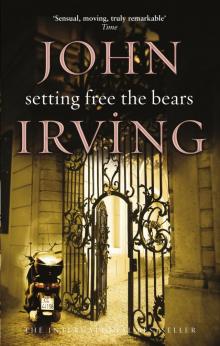 Setting Free the Bears
Setting Free the Bears The Fourth Hand
The Fourth Hand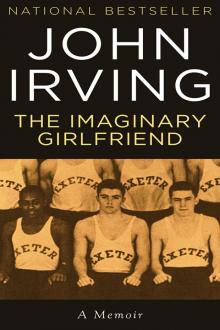 The Imaginary Girlfriend
The Imaginary Girlfriend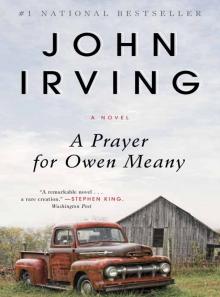 A Prayer for Owen Meany
A Prayer for Owen Meany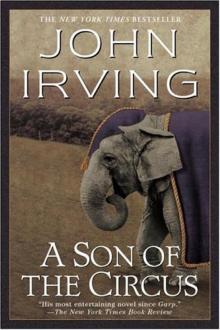 A Son of the Circus
A Son of the Circus Last Night in Twisted River
Last Night in Twisted River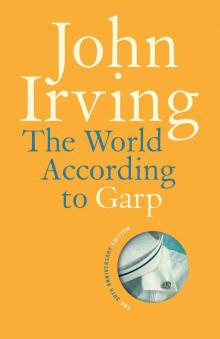 The World According to Garp
The World According to Garp The Cider House Rules
The Cider House Rules The Hotel New Hampshire
The Hotel New Hampshire The 158-Pound Marriage
The 158-Pound Marriage Until I Find You
Until I Find You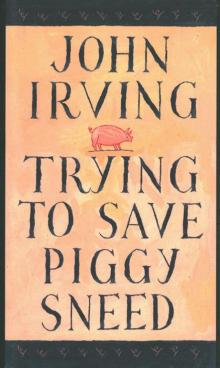 Trying to Save Piggy Sneed
Trying to Save Piggy Sneed Cider House Rules
Cider House Rules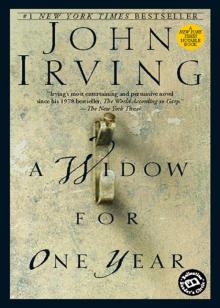 A Widow for One Year
A Widow for One Year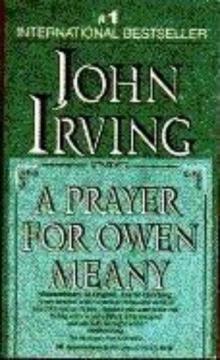 A prayer for Owen Meany: a novel
A prayer for Owen Meany: a novel (2005) Until I Find You
(2005) Until I Find You